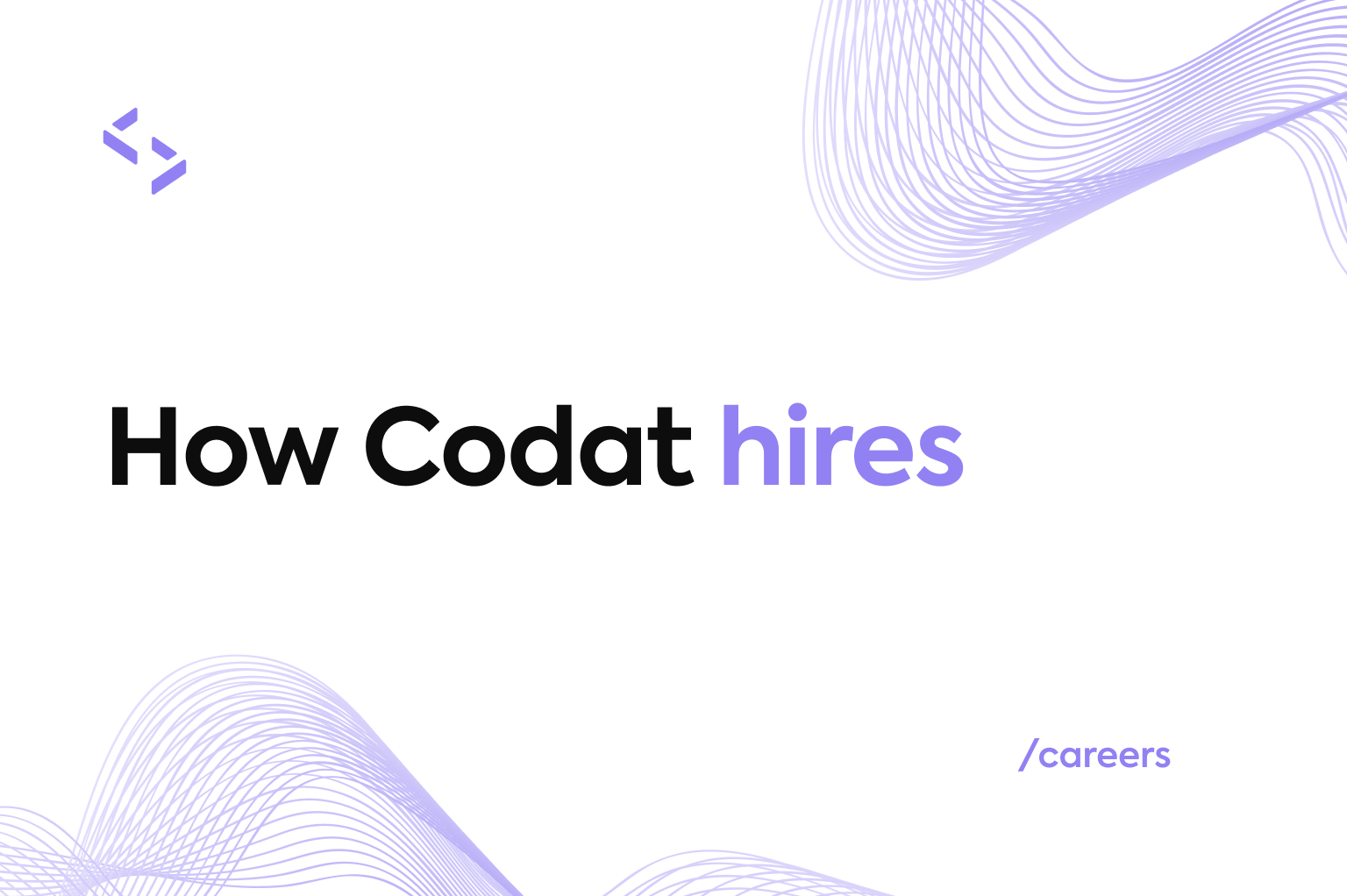
Hiring the right people only works if you hire in the right way.
In an industry where success is heavily indicative of the quality of your team, finding the talent you need to grow can be tough, especially when demand heavily outstrips supply. At Codat, we have built a mentality of moving fast, being efficient, and keeping the candidate’s perspective at the forefront of our minds.
Moving fast
It has become all too common to interview at a company and then not hear anything back for a week, or sometimes even longer. With many studies reporting that you make your decision on someone within five minutes, why do these companies take so long to feedback on their decision? We feel that moving fast and being flexible enables us to stay ahead of the competition and hire at the volume we require.
We’ve had leaders join Codat from large banks or other corporates that have this mentality ingrained in them – “what’s the rush?”, “I’ll let them know in a few days”. It takes a little persuasion to rip this out and for them to see and understand the need for quick decisions.
When you operate in a market where candidates are hard to find, it means that you aren’t the only company out there that’s trying to hire that specific individual sitting in front of you right now. If you move slowly, by the time you decide to make an offer, that candidate is likely already sitting on at least one other offer, or more likely, off the market entirely.
The importance of being flexible
Therefore, at Codat, we do all that we can to move dynamically and swiftly when it comes to interviewing candidates and making decisions. Our team knows the importance of being flexible with their time to accommodate the availability of when a candidate can see us. This means that we can book interviews on the very same day if need be. We have seen multiple examples of receiving a CV in the morning, doing a telephone chat in the afternoon, interviewing them face to face the next morning and making them an offer within an hour of that finishing. Going from CV to offer acceptance in under 36 hours.
Other than putting yourself in the best position possible to secure someone over the competition, there’s another reason why we want to move fast. It shows a desire on our side to have that person join our team. We truly believe that making a decision quickly shows candidates that we are excited and enthused by the idea of them joining us. We don’t want to hesitate or wait around, we show our keenness wholeheartedly and openly. Sometimes, that alone can be the clinching point for a candidate.
Being efficient
At Codat, we also find that being as efficient as we can makes us as effective as possible. The market is now candidate-driven, meaning you have to maximize your efforts as a company to attract the right talent. The way you interview someone, the number of “hoops” you make them jump through, the overall experience you provide is a direct reflection of you and your company. You have to make this as best as you can otherwise candidates will go somewhere else.
As well as having a slick process, another way efficiency appears at Codat is through our hiring committees. This is something we do immediately after an interview concludes. We gather all parties that have been involved in the interview process, sit down in a room together, and everyone has the opportunity to input their feedback. Ultimately, this enables us to make a decision quickly but it also enables us to make that decision effectively. By doing this so rigorusly, it has instilled a culture of prioritizing hiring and that, in turn, enables us to move fast as previously mentioned.
Putting candidates at ease
I also personally ensure that our People team covers two key areas when it comes to an interview process that others may overlook as being something insignificant. We always do a meet and greet with each candidate upon either arrival at the offices or at the start of a video interview. Sit them down, make them a drink, engage in some small talk, ensure their connection is good – whatever the circumstance may be. This is a very intentional process to make someone feel more at ease and let them relax for a moment before the interview begins. We are not looking for anything or trying to catch anyone out with any questions, it’s very simply us trying to do what we can to ensure that they will perform at their best and alleviate some nerves.
We also do a wrap up at the end of every interview. We do this to cover any questions candidates might have that they didn’t feel comfortable asking in an interview environment. It could be something they forgot to ask or anything they’d just like to know more generally about Codat as a whole, not specific to their role. The idea behind this is that we are often able to decide if someone is right for us within a single, one stage interview, but if we make that person an offer we want to make sure they have all of the information they might need (or want) to enable them to decide whether we are right for them. Sometimes they might have nothing at all for us, other times it can be a half an hour chat. Either way, we feel this is an important process to maximize the efficiency of our hiring.
Candidates’ perspectives
Nowadays, an interview is no longer one-sided. Candidates are interviewing you as much as you are interviewing them, it’s crucial to keep this in mind. They want to know whether you’re a company they want to work for, are there people they’d like to work alongside, will they get everything they want out of a new role here with you? Therefore, these steps are important to give everyone the best chance of finding the right fit for each other.
There are still far too many articles out there of senior leadership members talking about how they rigorusly screen candidates, really putting them through their paces. They paint a picture of a pretty awful interview experience for the candidates that dare go through it, but then discuss how they really struggle to fill niche roles. Well, duh! As I previously mentioned, the market now is candidate-driven. You and your company are not the only place someone like a Software Engineer is interviewing. You must keep their perspective at the forefront of your mind throughout the interview and the process as a whole.
Minimise red tape
When you have multiple interview stages, this could show to a candidate that your company is full of red tape and it takes a long time to get things over the line and completed. It could show that your company has no clear decision-makers and that getting work signed off or approved takes forever or never truly happens properly at all. When you have an interview stage that covers almost everything the previous stage covered, just with someone new in the company doing the interview – this could show that your team has poor communication skills and no one really knows what’s going on, no one is ever on the same page.
Admittedly all of these are, of course, hypothetical, a candidate has to take you at face value and I know from experience that these are thoughts that often crop up. Bear this in mind next time you devise an interview process and put someone through it. Think about the impression that you’re giving them with the questions you’re asking, the people they’re meeting and the different types of “hoops” you’re making them jump through.
In summary
I think that we will always be evolving our process. Markets shift, candidates’ demands, and expectations change, as will what we want and need from someone.
However, it remains that being able to be dynamic, to be flexible and fluid with processes and decisions, should enable us to keep ahead of the curve. We have always been, and I’m sure always will be able to move fast with our processes and decisions, as well as keeping the need and reasoning behind it clear for all managers, new or old that join Codat. We will also need to remain effective with our decision making, structuring processes, communication and partnerships with recruiters and candidates alike.
I truly believe that we will be able to continue to scale Codat to where we want it to be without any issues as long as we stick to these parameters, as well as keeping the candidate’s perspective clear in our minds.

Tom Denny, Head of People
